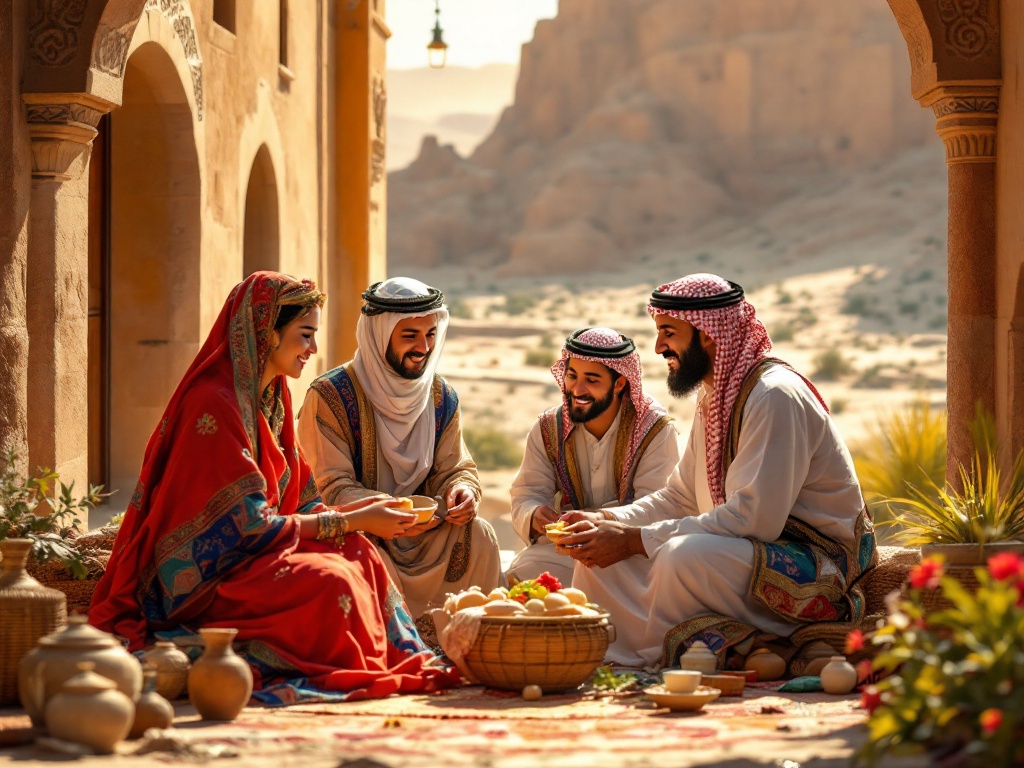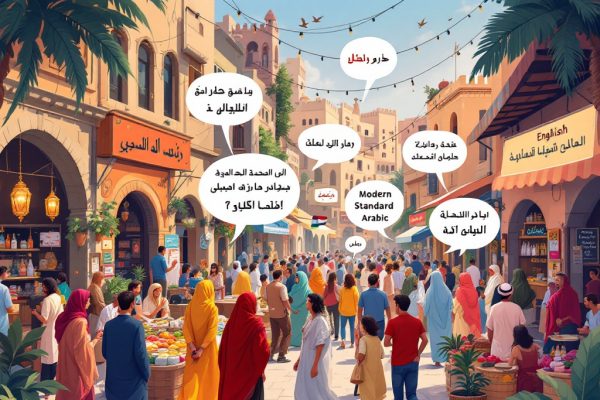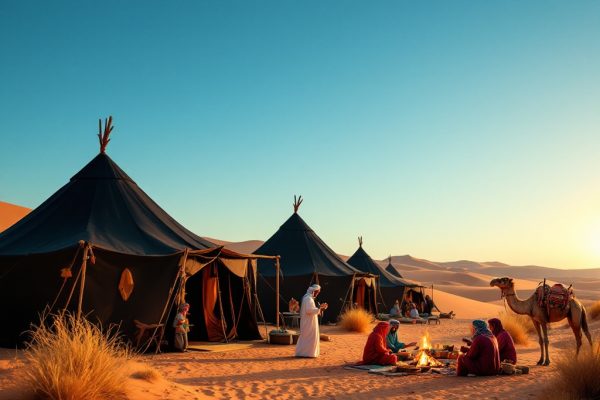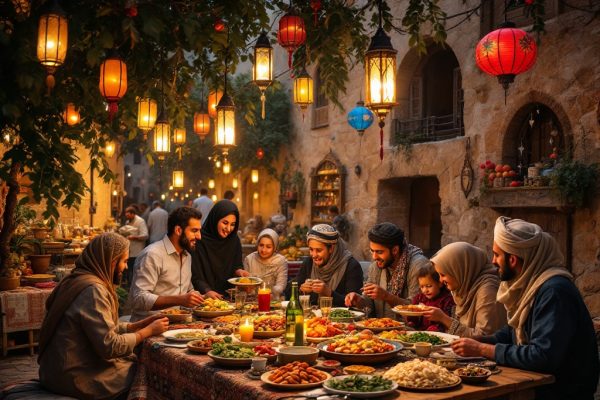Local Customs and Traditions in Jordan
Discover the captivating blend of ancient Bedouin traditions and modern Islamic practices that shape Jordan’s unique cultural identity. From heartwarming hospitality and generous gift-giving to vibrant religious festivals and the significance of family ties, explore the rich tapestry of Jordanian customs. Uncover the secrets to respectful interactions, appropriate attire, and dining etiquette, ensuring an enriching and immersive travel experience. Delve deeper into Jordan’s cultural heart and unlock the magic of this extraordinary land. Read on to prepare for your unforgettable Jordanian adventure.
Important information

- Jordanian culture blends Bedouin traditions and Islamic practices. Hospitality and family are highly valued.
- Dress modestly, covering shoulders and knees. This shows respect, especially at religious sites. Women might cover their hair in mosques.
- Accept offers of coffee or tea. It’s a polite gesture in Jordanian culture.
- Public displays of affection are best avoided. Ask permission before taking photos of people.
- Ramadan is a holy month. Be mindful of fasting and other related customs during this time.
Introduction to Local Customs and Traditions in Jordan
Jordanian culture is deeply rooted in Bedouin traditions and Islamic practices, forming a unique identity. Key values include hospitality, generosity, and strong family ties, further enriched by religious festivals and ancient customs. These traditions offer visitors a glimpse into authentic Jordanian life.
Hospitality
Offering coffee or tea is a common expression of Jordanian hospitality.
Generosity
Gift-giving is a vital component of social interaction in Jordan.
Family and community bonds play a central role in Jordanian society, shaping cultural values and fostering a strong sense of belonging.
Understanding Jordanian Culture
Jordanians are renowned for their warm hospitality and generosity, especially within their close-knit families and communities. Admire something openly, and you might be surprised to receive it as a gift, a testament to the importance of personal connections in their culture. Visitors to Jordan can expect heartfelt welcomes, experiencing this generous spirit firsthand. It’s simply the Jordanian way of life.
Hospitality in Jordanian Culture
Jordanians are renowned for their hospitality, warmly welcoming guests and ensuring their comfort. Traditional gestures include offering Arabic coffee, tea, or food, which guests are encouraged to accept. Central to this warm welcome is the concept of “salam” (peace), emphasizing the host’s focus on guest enjoyment. Often, Jordanians open their homes to visitors, demonstrating remarkable generosity and fostering a welcoming atmosphere.
Generosity and Gift-Giving Norms
Gift-giving is a common expression of generosity in Jordan. A host may offer a guest an admired item as a present. This is a frequent occurrence.
Importance of Family and Community Ties
Family forms the bedrock of Jordanian society, offering a strong support network built on powerful bonds. These close relationships greatly influence social practices, like collective decision-making, which further strengthens family unity.
Community ties are equally crucial, nurturing a sense of belonging and shared responsibility. These strong connections are woven into everyday life, highlighting the deep importance of community in Jordanian culture.
Common Greeting Customs in Jordan
Jordanians value personal relationships and demonstrate this through warm greetings. Men typically greet each other with a handshake. Women also shake hands, especially in professional environments. Close friends and family of the same gender often exchange light kisses on both cheeks as a further sign of affection.
Shaking Hands and Cheek Kissing
In Jordan, shaking hands is the standard greeting upon first meeting. However, cheek kisses are also common among Arabs to express warmth and affection, signifying a close bond.
Warm Greetings and Signs of Respect
When in Jordan, embrace the local custom of offering friendly greetings. Be mindful of those in prayer, especially in public areas, by refraining from interrupting them.
Personal Space and Social Interactions
Jordanians often prefer closer personal space than those accustomed to Western norms. Men typically greet with a firm handshake, while close male friends and family may exchange cheek kisses, a practice also observed among close female friends and family. It’s generally considered polite to avoid extended eye contact with someone of the opposite sex.
Dress Codes and Modesty
When traveling in Jordan, dressing respectfully is key, particularly at religious sites and in public. Covering your shoulders and knees, and avoiding tight or revealing clothing demonstrates cultural sensitivity. This thoughtful approach to attire applies to both men and women, and it’s an easy way to honor Jordanian customs. For women, consider carrying a scarf to cover your head when entering mosques or other holy places. For men, long pants and shirts with sleeves are generally recommended in such locations. By dressing modestly, you’ll not only blend in more respectfully but also experience a deeper connection with Jordanian culture.
Dressing Modestly as a Sign of Respect
When visiting Jordan, dressing modestly demonstrates respect, particularly in public areas. This often translates to covering your shoulders and knees. Traditional attire, like the thobe for men and the abaya for women, is commonplace, especially in more conservative regions. Religious sites often have additional customs, such as women covering their hair and men avoiding shorts. Respectful attire is essential to honoring Jordanian culture.
Appropriate Attire for Religious and Public Spaces
When visiting religious sites, dress modestly as a sign of respect. This typically means covering your shoulders and knees in places like mosques and churches. Women should also ensure their cleavage is covered. While public spaces have less stringent rules, modest attire is still valued. Women might opt for loose-fitting clothing, longer skirts, or pants. Men are generally well-suited in long pants and shirts.
Dress Code for Religious Sites
- Cover your shoulders and knees,
- Women should ensure their cleavage is covered.
Dress Code for Public Spaces
While public spaces have less stringent rules, modest attire is still valued.
- Women: Loose-fitting clothing, longer skirts, or pants,
- Men: Long pants and shirts.
Dining Etiquette in Jordan
Sharing small dishes, known as mezze, is central to Jordanian cuisine and symbolizes hospitality. Tipping, while customary, is at the diner’s discretion, with 10% considered generous in restaurants and cafes.
Mezze Dining Experience
Sharing small plates of mezze is a cornerstone of Jordanian dining, fostering a convivial atmosphere. Popular choices include hummus, baba ghanoush, falafel, and tabbouleh. Pita bread, ever-present, is ideal for enjoying these flavorful dips. This shared experience is fundamental to appreciating mezze.
Sharing Meals and Symbolism of Goodwill
In Jordan, sharing a meal transcends mere sustenance. It’s a profound expression of friendship and hospitality, forging strong social bonds and nurturing lasting relationships. Breaking bread together is a cornerstone of Jordanian culture, a gesture of goodwill that holds deep significance.
Tipping Practices in Restaurants and Cafes
Tipping is not required in restaurants and cafes in Jordan, but 10% is a generous amount for good service.
Religious and Cultural Observances
When visiting Jordan, immerse yourself in the vibrant tapestry of religious festivals. Remember that Islamic practices are deeply ingrained in Jordanian culture, and respecting them is paramount. Key celebrations like Ramadan, Eid al-Fitr, and Eid al-Adha offer a glimpse into these traditions. Dressing modestly, particularly at religious sites, demonstrates respect for local customs.
Participating in Religious Festivals
Jordan invites tourists to witness and occasionally partake in its vibrant religious festivals. These celebrations offer a unique lens into Jordanian culture, allowing visitors to experience local traditions, savor Jordanian cuisine, and observe religious practices firsthand. This provides an enriching immersion into the heart of Jordanian community life.
Respect for Islamic Practices and Religious Sensitivity
When visiting religious sites, dress modestly. During Ramadan, refrain from eating, drinking, or smoking in public during daylight hours. Alcohol consumption is generally discouraged. Avoid public displays of affection. Before entering a mosque, remove your shoes and ensure your attire is respectful. Women may need to cover their hair. Always request permission before photographing individuals, especially women. Be mindful of prayer times, as daily life often pauses to observe them. Learning a few basic Arabic phrases, such as “As-salamu alaykum” (peace be upon you), demonstrates respect and can foster positive interactions. Even a few words of Arabic can be greatly appreciated. Try to be considerate of local customs.
Traditional Islamic Events and Celebrations
Jordan observes key Islamic holidays such as Eid al-Fitr and Eid al-Adha. Eid al-Fitr concludes Ramadan, the holy month of fasting, with feasts and gift-giving. Eid al-Adha commemorates Abraham’s sacrifice through prayers and festivities. These celebrations emphasize Jordan’s rich Islamic traditions and strong community bonds. Jordan also proudly celebrates its independence every May 25th with patriotic displays like parades and speeches, fostering national unity and reflection.
Eid al-Fitr
This holiday marks the end of Ramadan, the Islamic holy month of fasting. It is celebrated with feasts, gift-giving, and family gatherings.
Eid al-Adha
This holiday commemorates Abraham’s willingness to sacrifice his son. It is celebrated with prayers, animal sacrifice, and festive meals.
These religious holidays highlight Jordan’s rich Islamic heritage and the importance of community bonds. Jordan’s Independence Day, celebrated every May 25th, is marked by patriotic displays such as parades and speeches. This national holiday fosters a sense of unity and encourages reflection on the country’s history.
Unique Jordanian Traditions
Bedouin culture is integral to Jordan’s rich heritage, expressed through captivating storytelling, poetry, and music. These traditions are celebrated at Jordanian festivals, such as the Jerash Festival of Culture and Arts, which showcases a vibrant array of artistic performances. Tribal identity plays a central role in elaborate Bedouin wedding ceremonies, filled with customary feasts, dancing, and unique rituals passed down through generations.
Bedouin Culture and Lifestyle
Bedouin culture is deeply rooted in nomadic traditions, where hospitality and family ties are highly valued.
Their lives unfold in the desert, often sheltered by goat-hair tents.
Camels play a vital role, providing both transportation and sustenance.
History and heritage are preserved through captivating storytelling and poetry.
The melodies of traditional instruments like the oud and rebab permeate the air.
A visit to a Bedouin camp offers a unique window into this fascinating lifestyle.
Jordanian Festivals and Cultural Events
Jordan offers a rich cultural experience throughout the year. Attend the Jerash Festival for a vibrant display of music, dance, and art from around the globe. Explore the Amman International Book Fair, a gathering for literature lovers and a hub for cultural exchange. Experience Jordan’s religious heritage during Islamic holidays like Eid al-Fitr and Eid al-Adha, marked by communal prayers, feasts, and acts of charity. Join the patriotic displays and festivities on Independence Day, celebrated every May 25th. Immerse yourself in local traditions at the Midsummer Festival, a vibrant celebration of Jordanian music, dance, and crafts.
Tribal Identity and Bedouin Weddings
Bedouin weddings are vital cultural events that showcase tribal identity and traditions through elaborate celebrations. These festivities often include traditional music and symbolic rituals passed down through generations. From the unique attire and special food to the specific customs, every aspect reflects the tribe’s rich heritage. Attending a Bedouin wedding offers a remarkable opportunity to experience Jordanian culture and tribal affiliations firsthand.
Experiencing Authentic Jordanian Lifestyle
Experience the magic of Jordan’s desert and immerse yourself in the rich Bedouin culture.
Guided Desert Tour
Embark on a guided tour and spend an unforgettable night under the stars in a traditional desert camp. Discover the art of ancient storytelling, enjoy vibrant Bedouin music, and savor authentic cuisine.
Bedouin Homestay
For a truly immersive cultural experience, choose a homestay with a local Bedouin family. Share their daily life, learn traditional crafts, and enjoy meals together, creating lasting memories.
Bedouin Cultural Tours and Desert Camps
Experience the enchanting Bedouin culture with a thrilling desert adventure. Discover the magic of traditional desert camps, savor authentic Bedouin cuisine, and be captivated by ancient music and mesmerizing storytelling. These immersive tours offer an unforgettable glimpse into a unique and timeless way of life.
Homestays with Local Families
Experience the true essence of Jordan with an immersive homestay. Live with a local family and discover their daily life, customs, and traditions firsthand. Gain unique insights into Jordanian culture and create unforgettable memories.
Practical Advice for Foreign Visitors
Respecting Jordanian customs will enrich your travel experience. Engaging politely with locals cultivates meaningful cultural exchange. Learning simple Arabic phrases, such as “As-salamu alaykum” (peace be upon you), shows respect and eases communication. Dress modestly, particularly when visiting religious sites, and always ask permission before taking someone’s photograph. Accepting offers of tea or coffee is seen as a polite gesture. Refrain from public displays of affection and be aware of Ramadan, Islam’s holy month. Bargaining is common practice in markets, but approach it respectfully. Jordan is predominantly Muslim, so understanding Islamic traditions demonstrates cultural sensitivity and enhances interactions.
Awareness of Local Customs and Etiquette
Respecting local customs strengthens relationships. When greeting someone in Jordan, a handshake is customary, while close friends often exchange cheek kisses. Jordanians value hospitality, so accepting refreshments shows respect. Enjoy the offered tea, coffee, or food. Dress modestly, especially in rural areas or religious sites. Family is paramount in Jordanian culture, and elders are highly respected. Observing these customs enriches your cultural exchange and demonstrates genuine respect.
Greetings
A handshake is the customary greeting in Jordan. Close companions often exchange cheek kisses.
Hospitality
Jordanians hold hospitality in high regard. Accepting offered tea, coffee, or food is a sign of respect.
Attire
Modest attire is important, particularly when visiting rural areas or religious sites.
Family and Elders
Family is central to Jordanian culture, and elders are deeply revered.
Engaging with Local Communities Respectfully
Show genuine interest in their lives and learn basic Arabic phrases to build respect and improve communication. Be aware of cultural norms, especially about photography and religious practices, always asking permission before taking photos. Engage in conversations about their culture and daily routines. Actively listening not only fosters understanding but also shows genuine care.
Support the local economy by buying their products, demonstrating your appreciation for their skills. When visiting religious sites, dress modestly and act respectfully, avoiding loud conversations or disruptive actions. Embrace new experiences by trying the local cuisine, joining cultural events, and exploring historical sites. These opportunities expand your horizons and deepen your understanding of their world.












